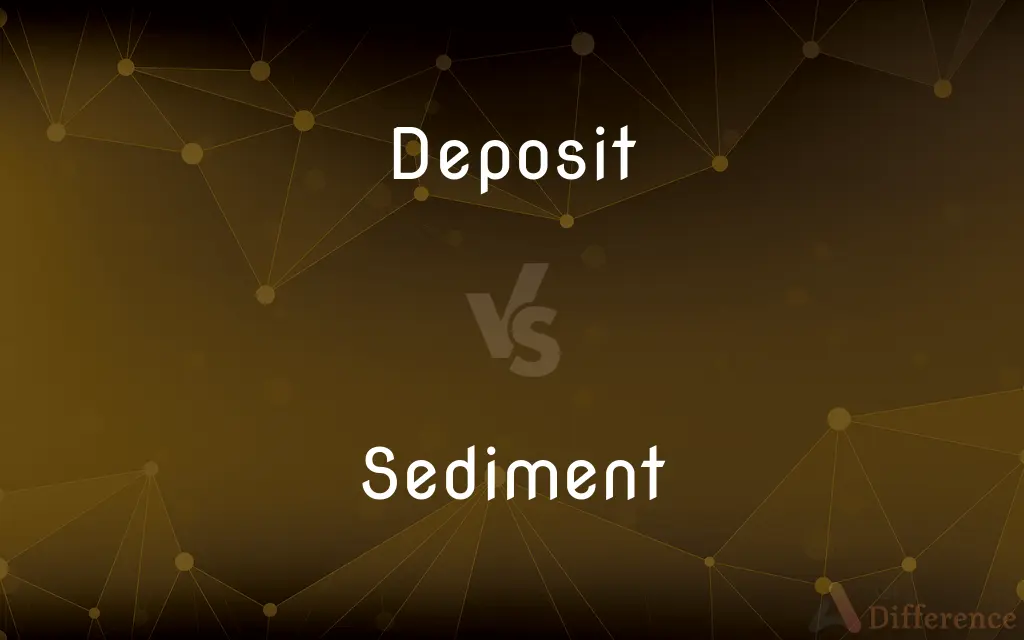Deposit vs. Sediment — What's the Difference?
By Tayyaba Rehman & Maham Liaqat — Updated on March 10, 2024
A deposit is a layer or accumulation of material, often minerals or organic matter, laid down by natural processes, while sediment is specifically the solid material that settles at the bottom of a liquid.

Difference Between Deposit and Sediment
Table of Contents
ADVERTISEMENT
Key Differences
Deposits encompass a broad range of materials, including minerals, soils, and organic substances, that accumulate through various processes like wind, water flow, and volcanic activity. Sediments, on the other hand, are more specifically the particles that settle from suspension in a fluid, typically water, but also air (as in dust) or ice (as in glaciers).
The formation of deposits can occur through multiple mechanisms such as precipitation from solutions, settling from suspension, or direct organic growth. Sediments typically form through the erosion and weathering of rocks, which are then transported and deposited in new locations by water, wind, or ice.
Deposits can include formations like mineral veins, coal beds, and oil deposits, which can be of significant economic interest due to their concentration of valuable resources. Sediments, while they can form economically important deposits like sand and gravel, are often studied in the context of geological and environmental processes, such as river deltas, lake beds, and ocean floors.
The term "deposit" can also be used in broader contexts, not strictly geological, to refer to any accumulation of material, such as bank deposits or deposits on surfaces (like dust on furniture). In contrast, "sediment" is predominantly used in geological, environmental, and related scientific contexts to describe the particulate matter that settles from fluids.
Deposits can vary greatly in scale, composition, and origin, and their study is important in fields like geology, mining, and archaeology. Sediment study, or sedimentology, is crucial for understanding earth's history, climate change, and ecosystem functions, focusing on the characteristics, distribution, and deposition processes of sediments.
ADVERTISEMENT
Comparison Chart
Definition
Layer or accumulation of materials laid down by natural processes.
Solid material that settles at the bottom of a liquid.
Formation
Can occur through precipitation, settling, or organic growth.
Typically forms through erosion and weathering, then transported and deposited by water, wind, or ice.
Examples
Mineral veins, coal beds, oil deposits.
Sand, silt, clay, and particles in river deltas, lake beds, ocean floors.
Economic Interest
Often significant due to concentrations of valuable resources.
Can form economically important deposits; studied for geological and environmental insights.
Context of Use
Broad, including geological and non-geological contexts.
Predominantly geological, environmental, and scientific contexts.
Compare with Definitions
Deposit
Results from processes like precipitation, wind deposition, or organic accumulation.
The limestone cave featured spectacular stalactite formations, deposits from mineral-rich water drips.
Sediment
Particles that settle from suspension in a liquid, often forming layers in bodies of water.
Sediments collected at the bottom of the lake reveal its ecological history.
Deposit
Used in both geological and broader contexts.
The artist used clay deposits from the riverbank for her pottery.
Sediment
Originates from the erosion of rocks, transported by water, wind, or ice.
The river carries sediment from the mountains to the plains, enriching the soil.
Deposit
Can include layers of minerals, soils, and organics.
Peat deposits in the wetlands are crucial for the local ecosystem.
Sediment
Includes materials like sand, silt, and clay in natural settings.
The sediment samples from the ocean floor provide clues about past climates.
Deposit
Many deposits are mined for resources like minerals, oil, and gas.
The area is known for its rich coal deposits, fueling the local economy.
Sediment
Primarily used in scientific contexts related to geology and environmental studies.
The study of sediment layers helps geologists understand Earth's geological history.
Deposit
A sum of money paid into a bank or building society account
Cash funds which are an alternative to bank or building society deposits
Sediment
While some sediments form valuable deposits, their study primarily offers environmental insights.
Sediment analysis helps in assessing the health of aquatic ecosystems.
Deposit
A sum payable as a first instalment on the purchase of something or as a pledge for a contract, the balance being payable later
We've saved enough for a deposit on a house
Sediment
Sediment is a naturally occurring material that is broken down by processes of weathering and erosion, and is subsequently transported by the action of wind, water, or ice or by the force of gravity acting on the particles. For example, sand and silt can be carried in suspension in river water and on reaching the sea bed deposited by sedimentation; if buried, they may eventually become sandstone and siltstone (sedimentary rocks) through lithification.
Deposit
A layer or mass of accumulated matter
The deposits of salt on the paintwork
Sediment
Matter that settles to the bottom of a liquid; dregs
The ice freezes the wine and sediment at the base of the cork
Deposit
The action of placing something in a specified place
I'd like to make a deposit
The deposit of a thesis in a library gives no guarantee of copyright protection
Sediment
Settle as sediment
The erythrocytes were allowed to sediment within the syringe
Deposit
Put or set down (something or someone) in a specific place
He deposited a pile of school books on the kitchen table
Sediment
Material that settles to the bottom of a liquid; lees.
Deposit
Place (something) somewhere for safekeeping
A vault in which guests may deposit valuable property
Sediment
Solid fragments of inorganic or organic material that come from the weathering of rock and are carried and deposited by wind, water, or ice.
Deposit
To put or set down; place.
Sediment
A collection of small particles, particularly dirt, that precipitates from a river or other body of water.
The Nile delta is composed of sediment that was washed down and deposited at the mouth of the river.
Deposit
To lay down or leave behind by a natural process
Layers of sediment that were deposited on the ocean floor.
Glaciers that deposited their debris as they melted.
Sediment
(transitive) To deposit material as a sediment.
Deposit
To give over or entrust for safekeeping.
Sediment
(intransitive) To be deposited as a sediment.
Deposit
To put (money) in a bank or financial account.
Sediment
The matter which subsides to the bottom, from water or any other liquid; settlings; lees; dregs.
Deposit
To give as partial payment or security.
Sediment
The material of which sedimentary rocks are formed.
Deposit
To become deposited; settle.
Sediment
Matter deposited by some natural process
Deposit
Something, such as money, that is entrusted for safekeeping, as in a bank.
Sediment
Deposit as a sediment
Deposit
The condition of being deposited
Funds on deposit with a broker.
Sediment
Settle as sediment
Deposit
A partial or initial payment of a cost or debt
Left a $100 deposit toward the purchase of a stereo system.
Deposit
A sum of money given as security for an item acquired for temporary use.
Deposit
A depository.
Deposit
(Geology) A concentration of mineral matter or sediment in a layer, vein, or pocket
Iron ore deposits.
Rich deposits of oil and natural gas.
Deposit
(Physiology) An accumulation of organic or inorganic material, such as a lipid or mineral, in a body tissue, structure, or fluid.
Deposit
A sediment or precipitate that has settled out of a solution.
Deposit
A coating or crust left on a surface, as by evaporation or electrolysis.
Deposit
(geology) Sediment or rock that is not native to its present location or is different from the surrounding material. Sometimes refers to ore or gems.
Deposit
That which is placed anywhere, or in anyone's hands, for safekeeping; something entrusted to the care of another.
Deposit
(banking) Money placed in an account.
Deposit
Anything left behind on a surface.
A mineral deposit
A deposit of seaweed on the shore
A deposit of jam on my countertop
Deposit
(finance) A sum of money or other asset given as an initial payment, to show good faith, or to reserve something for purchase.
They put down a deposit on the apartment.
Deposit
A sum of money given as a security for a borrowed item, which will be given back when the item is returned, e.g. a bottle deposit or can deposit
Deposit
A place of deposit; a depository.
Deposit
(transitive) To lay down; to place; to put.
A crocodile deposits her eggs in the sand.
The waters deposited a rich alluvium.
Deposit
To lay up or away for safekeeping; to put up; to store.
To deposit goods in a warehouse
Deposit
To entrust one's assets to the care of another. Sometimes done as collateral.
Deposit
(transitive) To put money or funds into an account.
I had to deposit two months' rent into my landlord's account before he gave me the keys.
Deposit
To lay aside; to rid oneself of.
Deposit
To lay down; to place; to put; to let fall or throw down (as sediment); as, a crocodile deposits her eggs in the sand; the waters deposited a rich alluvium.
The fear is deposited in conscience.
Deposit
To lay up or away for safe keeping; to put up; to store; as, to deposit goods in a warehouse.
Deposit
To lodge in some one's hands for safe keeping; to commit to the custody of another; to intrust; esp., to place in a bank, as a sum of money subject to order.
Deposit
To lay aside; to rid one's self of.
If what is written prove useful to you, to the depositing that which I can not but deem an error.
Deposit
That which is deposited, or laid or thrown down; as, a deposit in a flue; especially, matter precipitated from a solution (as the siliceous deposits of hot springs), or that which is mechanically deposited (as the mud, gravel, etc., deposits of a river).
The deposit already formed affording to the succeeding portion of the charged fluid a basis.
Deposit
A natural occurrence of a useful mineral under the conditions to invite exploitation.
Deposit
That which is placed anywhere, or in any one's hands, for safe keeping; something intrusted to the care of another; esp., money lodged with a bank or banker, subject to order; anything given as pledge or security.
Deposit
A bailment of money or goods to be kept gratuitously for the bailor.
Deposit
A place of deposit; a depository.
Deposit
The phenomenon of sediment or gravel accumulating
Deposit
Matter deposited by some natural process
Deposit
The natural process of laying down a deposit of something
Deposit
Money deposited in a bank
Deposit
A partial payment made at the time of purchase; the balance to be paid later
Deposit
Money given as security for an article acquired for temporary use;
His deposit was refunded when he returned the car
Deposit
A payment given as a guarantee that an obligation will be met
Deposit
A facility where things can be deposited for storage or safekeeping
Deposit
The act of putting something somewhere
Deposit
Fix, force, or implant;
Lodge a bullet in the table
Deposit
Put into a bank account;
She deposites her paycheck every month
Deposit
Put (something somewhere) firmly;
She posited her hand on his shoulder
Deposit the suitcase on the bench
Fix your eyes on this spot
Deposit
An accumulation of natural materials, often valuable, formed through various processes.
The mining company discovered a significant gold deposit in the mountainous region.
Common Curiosities
What is the economic importance of sediments?
While sediments themselves may not always be economically valuable, they can form deposits like sand and gravel used in construction, or indicate the presence of valuable resources like oil.
Are deposits renewable resources?
Most geological deposits are considered non-renewable on human timescales, as they take millions of years to form.
How do scientists study sediments?
Scientists study sediments through methods like core sampling, which allows them to analyze the composition, layering, and other properties of sediment layers.
How does climate change affect sediment distribution?
Climate change can alter patterns of erosion and sediment deposition, affecting river flows, coastal erosion rates, and sediment supply to marine ecosystems.
What role do sediments play in ecosystems?
Sediments can provide essential nutrients for aquatic plants, serve as habitats for various organisms, and influence water quality and clarity.
Can sediment turn into rock?
Yes, over time and under pressure, sediment can lithify, turning into sedimentary rock.
Are all deposits made of sediment?
Many deposits are composed of sediments, but not all. Some deposits are formed from organic material or chemical precipitation.
Can the movement of sediments cause problems?
Yes, sediment transport can lead to issues like river and lake siltation, coastal erosion, and the degradation of aquatic habitats.
Are there man-made deposits?
Yes, there are man-made deposits, such as landfills and tailings from mining operations, which are accumulations of waste materials.
Can deposits form in the atmosphere?
Yes, atmospheric deposits can occur, such as dust or volcanic ash settling from the air, though these are not typically referred to as sediments.
Share Your Discovery

Previous Comparison
Bourgeoisie vs. Proletariat
Next Comparison
Guitar vs. ShreddingAuthor Spotlight
Written by
Tayyaba RehmanTayyaba Rehman is a distinguished writer, currently serving as a primary contributor to askdifference.com. As a researcher in semantics and etymology, Tayyaba's passion for the complexity of languages and their distinctions has found a perfect home on the platform. Tayyaba delves into the intricacies of language, distinguishing between commonly confused words and phrases, thereby providing clarity for readers worldwide.
Co-written by
Maham Liaqat















































